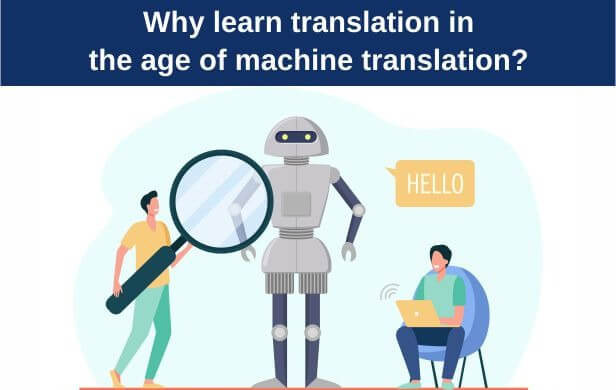
Advances in IT have touched all professions and the field of translation is no exception. The use of CAT (computer aided translation) tools and machine translation is now very common in the language industry. CAT tools have been designed to ease the burden of human translators and help them do their job more efficiently and faster. In machine translation, a computer software automatically translates texts from one language to another without human involvement. If this is the case, then it begs the question, why should one learn translation at all?
New sophisticated translation programs driving machine translation deliver translations with a varied level of accuracy and there is a need for human translators in order to render effective translations. The reason for this is that the faculty of understanding and making sense of the text is unique to humans and so they will always be in demand as long as there is requirement of translating from one language into another. However accurate the machine translation is, there are always nuances which can get missed out in translation and this calls for human intervention.
The translator requires good analytical skills to be able to analyze the context of the original text accurately since the context can reveal different meanings of a given word/term. Domain and technical knowledge are key to precise translations in any industry – whether it is IT, aviation or culinary arts! In-depth understanding of the content and context of the original text demands good research skills. Furthermore, the translator must have excellent linguistic skills to choose the right terms and phrases coupled with proper usage of grammar in order to recreate the accurate meaning of the original text in the translated text. The translator must therefore acquire all these skills in order to deliver an accurate and effective translation or also to review machine translations, as without this knowledge the translator cannot pick out translation errors which are not obvious. The development and honing of these linguistic, analytical, writing and research skills calls for extensive translation training to understand the nitty-gritties of the trade and to begin the journey of learning to translate well.
Translation is a complex process as it is not a scientific calculation or a mathematical equation that could be programmed into an intelligent machine. The process involves the work of a professional linguist/translator, usually a native speaker or one who has studied or worked in the target language and the domain extensively. The translator can render a version that captures the spirit and meaning of the original using the right tone and style suitable for the target reader of the translated text. Ideally all Technical, Legal, Medical, texts should have a human in the loop as these are sectors with critical content to be communicated.
At Language Services Bureau, with ample experience of 43 years in the language industry, we introduced Orientation Course in Translation 5 years back and keep offering this course to language enthusiasts every quarter – to learn the basics of translation into English from multiple Indian and international languages like Hindi, Marathi, Gujarati and German, French, Spanish, Italian and Portuguese. Register today for our upcoming course!
For any queries related to language translation services. Inquire at our email address below or give us a call today!
info@languageservicesbureau.com
Telephone: +91-20-24470509, +91-82370 60559
Similar articles for you...

आमच्या गेल्या महिन्यातील ब्लॉग मध्ये भाषांचे ज्ञान आवश्यक असणाऱ्या करियर क्षेत्रांची माहिती आपल्याला मिळाली. जिथे भाषेचे ज्ञान फायद्याचे ठरते असे इतर व्यवसाय आपण या महिन्यात पाहुयात.

Posted by : Language Services Bureau

The time it takes to learn a language depends on what you want to do with it– here is a great article about language learning and the kind of expectations you can set about the time required for the same!